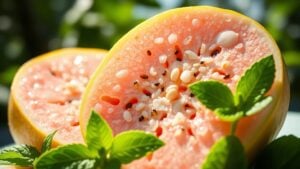Guava could just be the most underrated fruit you’ve never thought twice about—packed with nutrients, it’s basically a superhero in disguise. This little gem not only enhances your immune system but also helps with digestion and heart health. You’re probably curious, what exactly makes guava so special? Well, stick around, and you’ll uncover the fascinating benefits and nutritional facts that’ll make you want to grab a guava right away.
What Is Guava?
Guava, a charming tropical fruit, brings a burst of flavor to your palate that’s hard to resist. Originating from Central America, this pleasant fruit, scientifically known as Psidium guajava L, is now enjoyed in many tropical and subtropical regions.
Guava comes in various sizes, measuring 2–4 inches in diameter, with skin that’s either green or yellow, and flesh that can be light green, yellow, or a deep pink to red hue.
As you bite into a ripe guava, you’ll encounter a revitalizing taste that’s sweet with a slight tartness, reminiscent of pears and strawberries. Inside, you’ll find numerous small, edible seeds—adding to the unique experience of enjoying guava fresh.
Health Benefits of Guava
At the time you ponder enhancing your well-being, contemplate integrating this charming tropical fruit into your meals. The health benefits of guava are impressive.
Its vitamin C content, providing 228% of your daily value, strengthens your immune system and aids collagen production. Guava’s high fiber—9g per cup—supports digestive health, keeping constipation at bay.
Plus, it can help regulate blood sugar levels thanks to its low glycemic index, which is great for diabetes management. Should heart health be a priority, regular guava consumption might lower LDL cholesterol and improve HDL levels.
Additionally, should you experience menstrual cramps, guava leaf extract can reduce pain intensity. With these benefits, guava could become a staple in your diet!
Nutritional Facts of Guava
At the time of evaluating the nutritional benefits of guava, you’ll uncover a wealth of healthful components packed into this small, tropical fruit. One guava (55g) is truly impressive:
- Calories: Just 37 calories
- Fiber: 12% of your daily fiber needs
- Vitamin C: Over 200% of the recommended daily intake
- Carbohydrates: 8g, including 3g of fiber and 5g of natural sugars
- Minerals: 220mg of potassium and 12mg of magnesium
You also benefit from antioxidants like lycopene, with a glycemic index ranging from 12 to 24.
This low glycemic index makes guava a fantastic choice for managing blood sugar. Enjoying guava can definitely enhance your health and satisfy your sweet tooth!
Guava Leaf Tea Benefits
Should you be seeking a natural method to aid your blood sugar levels and enhance your digestive health, guava leaf tea could just be your new best friend.
Packed with polyphenols, it can assist in regulating carbohydrate absorption, making it a superb choice for those keeping an eye on their blood sugar.
Additionally, its digestive perks can leave you feeling more at ease and lighter, so why not give it a try?
Blood Sugar Regulation
At the time you’re looking for natural ways to keep your blood sugar levels in check, guava leaf tea could be a marvelous option to investigate. This tea is rich in guava leaf extract, known for its benefits in managing blood glucose levels. Here’s what makes it beneficial:
- Inhibits alpha-glucosidase enzymes, lowering postprandial blood sugar.
- Reduces fasting blood glucose levels markedly in prediabetics.
- Quercetin improves GLUT4 activity, increasing glucose uptake.
- Regular use can lower HbA1c levels in type 2 diabetics.
- Delivers hypoglycemic effects without stimulating insulin secretion.
With these factors, guava leaf tea serves as a gentle, supportive ally in your path to manage diabetes effectively and safely.
Digestive Health Support
Whether you’re managing your blood sugar or simply looking for ways to support your general health, guava leaf tea has more to offer than meets the eye.
Guava leaf extracts are packed with tannins that can help reduce diarrhea symptoms through curbing microbial growth. Studies show that these powerful leaves might help decrease stool frequency and improve stool consistency for those handling acute diarrhea.
The tea’s polyphenols play a key role via regulating carbohydrate absorption, helping stabilize blood sugar, and supporting digestive health.
Plus, guava leaves could help relieve symptoms of irritable bowel syndrome through their antispasmodic effects. With antibacterial properties against gut pathogens, integrating guava leaf tea into your routine can offer significant digestive health benefits.
How to Eat Guava
Eating guava is as simple as biting into it like an apple, skin and all, for a fiber-packed snack.
In case you want to get creative, try slicing it into cubes for a revitalizing salad or tossing it into a smoothie for a tropical twist.
You can even scoop out the soft flesh for a delicious addition to yogurt or baked goods, bringing a burst of flavor to your meals!
Fresh Guava Preparation Tips
Getting ready to enjoy a delicious guava can be just as exciting as biting into one. Follow these simple preparation tips to make the most of this nutritious fruit, packed with vitamin C and dietary fiber:
- Wash guava thoroughly under running water.
- Slice it horizontally to expose the seeds and soft flesh.
- Consider eating guava with the skin for added fiber.
- In case you prefer it peeled, that’s perfectly fine too!
- Store ripe guava in the refrigerator for up to two days, or freeze cubed pieces for longer storage.
Guava fruit is a fantastic addition to your healthy diet, giving you a pleasurable sweetness.
Just keep in mind, a single serving can provide you with over 200 mg of vitamin C, helping you on your daily nutrition path.
Creative Guava Recipe Ideas
At the time you’re on the hunt for delicious ways to enjoy guava, you’ll find that this tropical fruit opens up a world of culinary creativity. You could blend guava with yogurt and honey for a smoothie that packs over 200% of your daily vitamin C in one go.
In case you’re up for something fresh, try guava salsa made with red onion, cilantro, and lime, which is low in calories while being a great source of dietary fiber.
For breakfast, top Greek yogurt with sliced guava and granola for a protein lift.
In the end, freeze pureed guava with coconut milk for tasty popsicles that offer a revitalizing treat rich in antioxidants—all while helping with weight management.
Risks of Eating Guava
While guava packs a healthy punch, it’s essential to be aware of the potential risks that come with enjoying this tropical fruit.
Overindulging can lead to some uncomfortable side effects:
- Digestive issues like bloating or diarrhea due to its high fiber content.
- Guava seeds could pose a choking hazard for young kids or anyone who struggles to swallow.
- You could experience rare allergic reactions in case your body doesn’t respond well to this fruit.
- Constipation or liver damage may occur from drinking too much guava leaf tea.
- Should you’re diabetic, keep an eye on your blood sugar because excessive guava consumption can affect your levels.
Tips for Consuming Guava
You can truly savor guava while reaping its numerous health benefits through grasping how to enjoy it best. Here are some tips to maximize your guava experience:
| Tip | Benefits | How to Enjoy |
|---|---|---|
| Eat raw with skin | Excellent source of vitamin C, fiber | Snack on it as is |
| Blend in smoothies | Retains vitamin C, supports immunity | Add to your morning routine |
| Pair with iron foods | Boosts iron absorption | Mix with spinach or lentils |
Additionally, studies show that brewing guava leaf into tea could help reduce the intensity of blood glucose and lipid levels, promoting a balanced glucose and lipid profile. Enjoy guava regularly to meet your recommended daily intake!
Guava Recipes
Guava, with its vibrant flavor and pleasant aroma, can easily elevate your meals and snacks to a new level. Here are some tasty guava recipes you’ll love:
- Blend guava (Psidium guajava) into smoothies with yogurt and honey for a vitamin C-rich drink, giving you over 200% of your daily vitamin C.
- Toss sliced guava in salads with cheese and nuts for a sweet, crunchy treat while adding 3g of fiber.
- Spread guava jam on toast—it’s packed with antioxidants and 20mg of vitamin C per tablespoon.
- Try grilled guava sprinkled with cinnamon for a flavorful low-calorie dessert.
- Sip on guava leaf tea to help regulate blood glucose, thanks to its polyphenols.
Enjoy exploring the enjoyable ways guava can enrich your meals!




